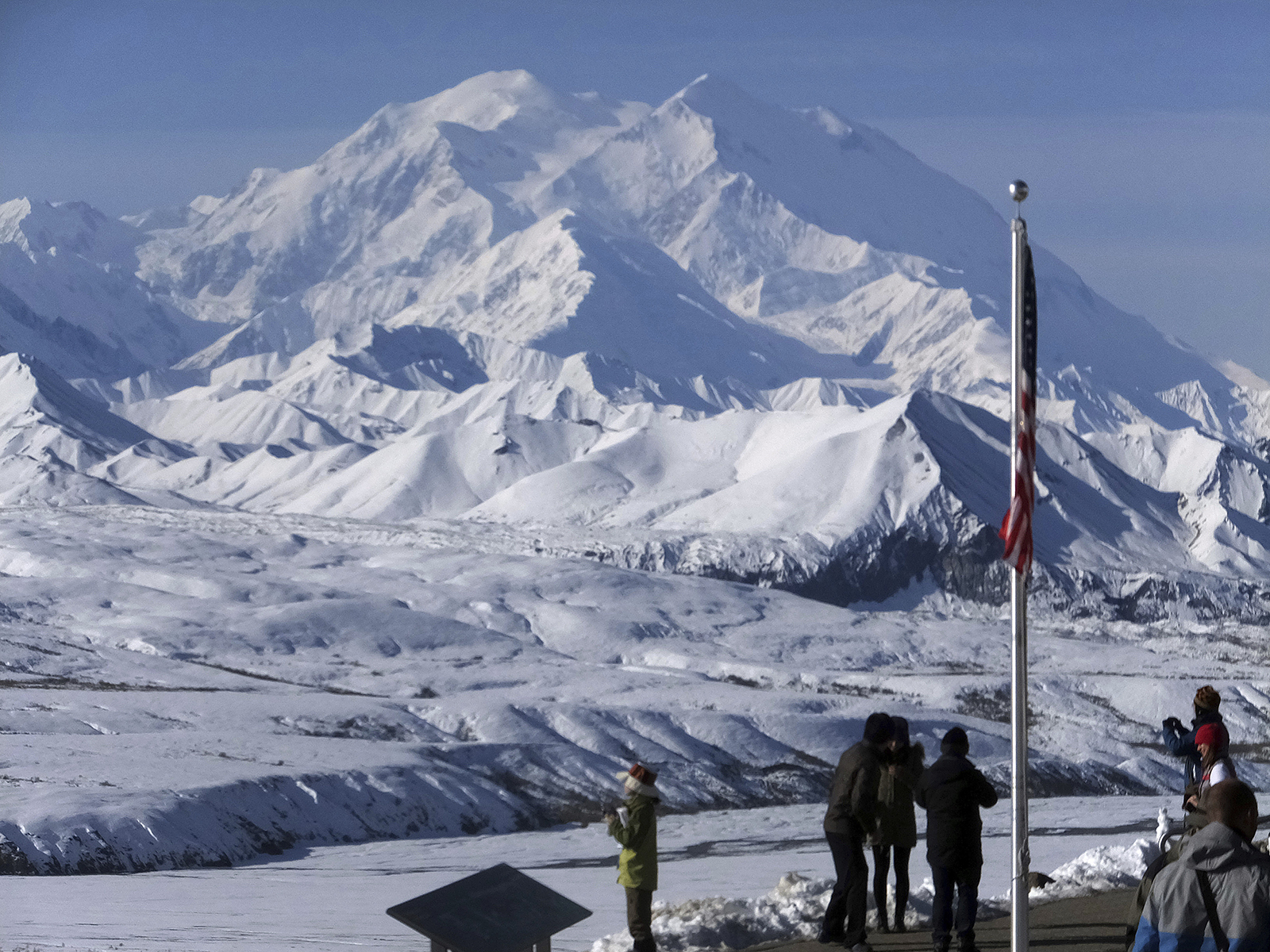
People stand at the Eielson Visitor Center with a view of North America’s tallest peak, Denali, in the background, Sept. 2, 2015, in Denali National Park and Preserve, Alaska. (AP/Becky Bohrer, file)
In his second inauguration address on Monday (Jan. 20), President Donald Trump repeated his customary campaign speech promises to improve the United States' credibility around the world, but after one such vow the president surprised some by announcing America's resurgence would entail new names for some familiar geographical features.
"A short time from now we are going to be changing the Gulf of Mexico to the Gulf of America," Trump said, "and we will restore the name of a great president, William McKinley, to Mount McKinley, where it should be and where it belongs." A few hours later he signed an executive order doing just that.
Alaska Native leaders, as well as state politicians, object that the order undoes years of work with the federal government to establish Denali as the rightful name.
"Located on the traditional homelands of the Dene peoples, it reflects a profound spiritual and cultural relationship with the land," said Emily Edenshaw, president and CEO of the Alaska Native Heritage Center. "Keeping this name honors that connection and recognizes the enduring contributions of Alaska Native peoples."
In a statement on X, Alaska Sen. Lisa Murkowski wrote, "I strongly disagree with the President's decision on Denali. Our nation's tallest mountain, which has been called Denali for thousands of years, must continue to be known by the rightful name bestowed by Alaska's Koyukon Athabascans, who have stewarded the land since time immemorial."
Denali, which means "the High One" in Koyukon Athabascan, is indeed the traditional name for the 20,310-foot peak in Denali National Park and Preserve, covered by snow and glaciers year-round and visible from hundreds of miles away. But the park has only been known officially as Denali since 1980, according to a National Park Service website. Despite the advocacy of the park's first superintendent, Harry Karstens, for "Denali," as early as 1913, it had been popularly known as Mount McKinley since at least 1901, after President William McKinley was assassinated, and the area became Mount McKinley National Park on Feb. 26, 1917.
Advertisement
In the 1970s, the Tanana Chiefs Conference, a consortium of Athabascan tribes in interior Alaska, started working to change the name of the mountain but was blocked by the congressional delegation with McKinley's home state of Ohio. In 2015, President Barack Obama's secretary of the interior, Sally Jewell, changed the mountain’s name to Denali just in time for its namesake park to celebrate 100 years.
Murkowski was part of that fight, she said in a statement on her website on Monday. "For years, I advocated in Congress to restore the rightful name for this majestic mountain to respect Alaska’s first people who have lived on these lands for thousands of years." She added, "This is an issue that should not be relitigated."
The Tanana Chiefs Conference did not respond to requests for comment on Trump's executive order. Other Alaska Native groups say it's too early to know how they'll respond.
Trump's wish to see it renamed for McKinley, the 25th president, a Republican who was assassinated early in his second term, appears to be motivated by Trump's plans to broaden tariffs on imports. Monday's executive order celebrates McKinley as a champion of "tariffs to protect U.S. manufacturing, boost domestic production, and drive the U.S. industrialization and global reach to new heights."
But Edenshaw argued that Indigenous values should take precedence. "These names carry the wisdom, identity and stories of the original stewards of this land. Restoring and honoring them acknowledges the deep, millennia-old connections that Indigenous peoples maintain with these lands and is a step toward respect and reconciliation," she said.
Edenshaw's organization advocates for Indigenous place names for a variety of reasons. "As we move forward in times of change, we hope to foster collaboration rooted in shared values of respect and understanding," she said. "Together, we can celebrate the resilience of our shared heritage while building a foundation for reconciliation and unity across our great state and nation."






